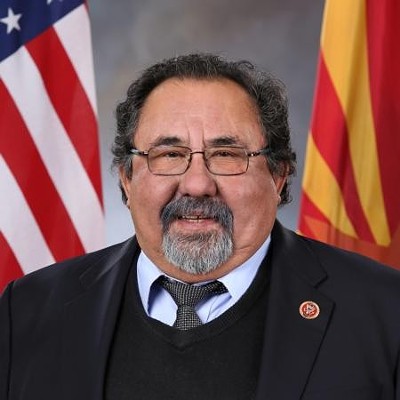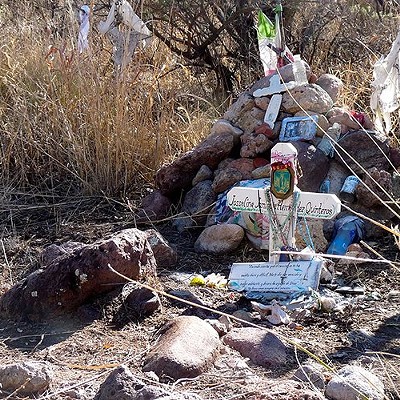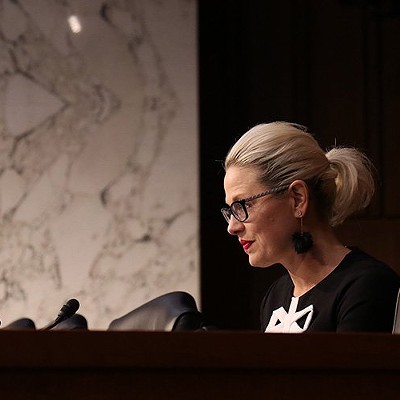But despite hard-liners' most fervent hopes, the army of unaccompanied children pouring across our borders just won't vaporize. Instead, their numbers are rising, even as efforts to guarantee their safety makes fitful progress in Congress.
Roughly 85,000 juveniles are apprehended by the Border Patrol each year. But according to Amnesty International, the number of those children traveling alone--typically to reach family members living in the United States--has jumped by more than 100 percent during the last seven years. Immigration experts say it's a part of a trend toward family reunification in this country, as border security crackdowns make crossings more treacherous.
But these children also run a bureaucratic gauntlet when they're apprehended and squeezed into an already overcrowded alien detention system. Their predicament was spotlighted recently, when two area Border Patrol agents alleged that such unaccompanied children are regularly released to anyone willing to claim them. "I've worked in stations (across the Southwest), and I've seen it at every station that I've worked at," says one agent, who spoke only on the condition of anonymity to protect his job. "(Agents) will say, 'Does anybody know this child?' And if nobody raises their hand, (the agent) will kind of start coaxing them" to take the child. "That's pretty much the way it is. It's because they don't want to do the paperwork."
Releasing such children into questionable circumstances is certainly immoral. But it also places them at great risk on the treacherous international frontier, says Theresa Kilbane, a child-protection official with UNICEF Mexico.
In collaboration with the Mexican social agency DIF, Kilbane's office recently released a report documenting their plight. "These children face innumerable risks," she writes in an e-mail to the Tucson Weekly. "They can be subject to sexual exploitation, child labor, physical and verbal abuse, drug addiction and trafficking."
At the same time, Kilbane cites "reports of children being separated from their parents in the process of being picked up by the Border Patrol and then repatriated to a different border town from their parents, complicating their eventual repatriation within Mexico."
So one thing remains clear: Both in and out of custody, the future for these children is fraught with risk. And one bill that could give them minimum protection has become a football in Congress, though optimists are hoping for its passage--in some form--late this week. Introduced by Sen. Dianne Feinstein, D-Calif., the Unaccompanied Alien Child Protection Act would establish benchmarks for the treatment of such minors. "This bill would not grant unaccompanied children any new immigration benefit, but it would ensure that they are treated as children, and not as adults or criminals," she said in January. "More importantly, this legislation seeks to ensure that all unaccompanied alien children are treated fairly and compassionately."
Among other things, Feinstein's bill would standardize legal representation, set basic care standards, create guidelines for establishing the age of these children and create a system giving them free legal representation.
The measure garnered unanimous support in last year's Senate, but was stalled by House conservatives. However, the current immigration debate raises hopes that it may emerge attached to other legislation.
Still, even this proposal doesn't plumb what one immigrant-advocate calls "the 72-hour black hole," when migrant children are first apprehended and remain in Border Patrol and Department of Homeland Security custody, before they're turned over to the U.S. Office of Refugee Resettlement. Feinstein's measure "didn't address this simply because it is a black hole," says Christopher Nugent, legal counsel for the Women's Commission for Refugee Women and Children in Washington, D.C. "People aren't really aware of what happens (to these children) in the first 72 hours."
But they are learning: While the Feinstein bill doesn't mandate immediate legal representation for children in Border Patrol custody, it does mandate the additional training of officers coming in contact with them. "And it tries to strengthen procedural safeguards for the most vulnerable of children from contiguous countries, such as asylum seekers, and abused, abandoned or neglected children," Nugent says. "That includes children who are too young to make a decision on voluntary departure, or children who are incompetent by virtue of mental retardation."
Perhaps this humanitarian measure would be even further along if not for the White House, which is reportedly running a stealth campaign to kill it. "Feinstein keeps trying to pass her bill, but other senators keep raising objections," says one Washington, D.C., reform advocate, who asked not to be named due to the sensitivity of her position. "And the executive branch--including the Department of Justice--keeps on feeding other senators a whole series of complaints about the bill."
Meanwhile, these children have been largely ignored in separate immigration-reform measures pushed by Arizona Sens. John McCain and Jon Kyl. Phone calls to the offices of both senators were not returned.
In September, Arizona Rep. J.D. Hayworth also forwarded his own get-tough immigration measure, which includes Border Patrol buildups and harsh crackdowns on those hiring illegal aliens. But Hayworth's plan doesn't carry a hint of how to protect unaccompanied minors. Questions about these vulnerable children instead raises a chuckle from Hayworth spokesman Larry VanHoose. "It sounds like a parenting problem to me," he says.
And that sums up the key failure of get-tough immigration measures being marched around Capitol Hill, according to Christina DeConcini, policy director for the National Immigration Forum. "Restrictionists who are interested in completely tightening the border--instead of trying to solve the problem--have completely left out the needs of this incredibly vulnerable population," she says.












